CATEGORIES OF MEMBERS
Read Logos Description
REGULAR MEMBERS
| NAME | EXPERTISE | INSTITUTION | THEMES |
|---|---|---|---|
Aleksandra Buha Djordjevic | Toxicology of Mixtures. Chemical Carcinogenesis. Risk Assessment. | University of Belgrade | 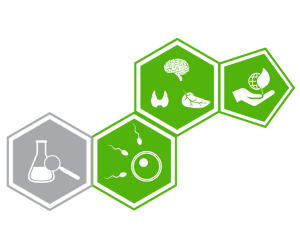 |
Annegaaike Leopold | Risks Assessment. Management of Organic Chemicals. Ecotoxicology. Birds. Amphibians. Fish. | The University pf British Columbia | 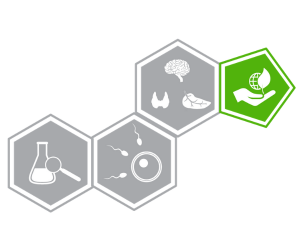 |
Barbara Demeneix | Molecular Physiology and Adaptation. Thyroid Function. | Muséum d’Histoire Naturelle de Paris | 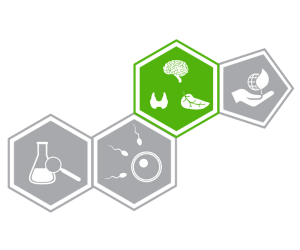 |
Barbara Hales | In Memoriam ICEDA would like to acknowledge Dr. Hales' world-renowned expertise and scientific contributions in developmental and reproductive toxicology. Dr. Hales has been heavily involved in the Committe on Research Initiatives and Excellence of ICEDA since the beginnings of the network. | McGill | 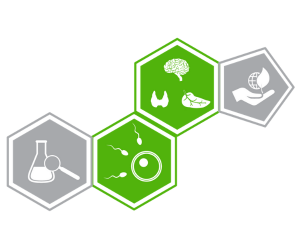 |
Beate Escher | Environmental Risk Assessment. in vitro Bioassays Effect-Based Trigger Values. | Helmholtz Centre for Environmental Research – UFZ | 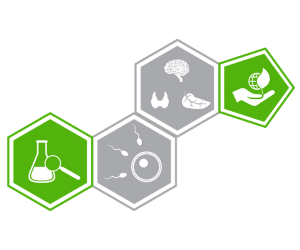 |
Bernard Robaire | Pharmacology and Therapeutics. | McGill |  |
Caren Helbing | Biochemistry and Microbiology. Wildlife Health Assessment. Cellular Mechanisms of Amphibian Metamorphosis. Non-Destructive Health Indicators. Genomics. | University of Victoria | 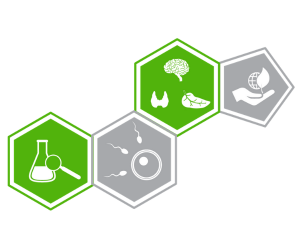 |
Carole Yauk | Genomics. Genetic Toxicology. Hereditary Mutation. Modeling of the Reference Dose. Development and Validation of Biomarkers. Adverse Effects Pathway. | Université d'Ottawa |  |
Cathy Vaillancourt | Toxicology of Pregnancy and Implication of Environmental Factors on the Human Placenta and Fetal Programming. | INRS |  |
Charles Ramassamy | Oxidative Stress. Brain Functions. Neurodegenerative Diseases. Pesticides. | INRS |  |
Chris Metcalfe | Distribution and Toxic Effects of Contaminants in the Environment. | Trent University | 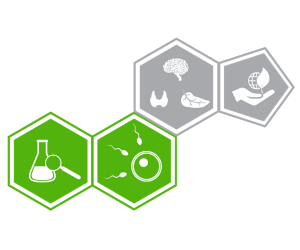 |
Christopher J Martyniuk | Environmental and Human Toxicology. Molecular Toxicology. Omics. Environmental Sciences. Neurodegeneration. Neurotoxicology. | University of Florida |  |
Christopher Kassotis | Pharmacology. Toxicology. Endocrinology. Biology. Human/Animal Health. Metabolic Health. Zebrafish. Mouse Models. | Wayne State University |  |
David Renault | Invasive Species. Stress. Ectotherm. Metabolomics. Chromatography (GC-MS, LC-MS). | Université de Rennes 1 | 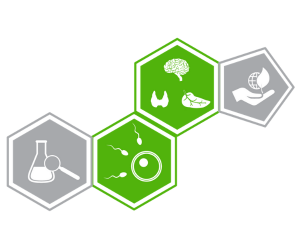 |
David Siaussat | Ecotoxicology. Olfaction. Pollutants. Insects. Adaptation. Ecophysiology. Insect Endocrinology. | Sorbonne Université | 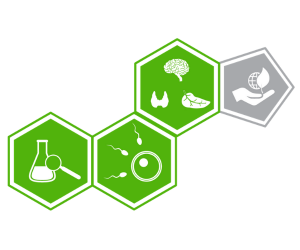 |
Ella Atlas | Endocrine Disruption and Metabolic Disruption of Toxic Substances. | Health Canada |  |
Élyse Caron Beaudoin | Toxicology. Molecular Biology. Public and Environmental Health. Community-Based Research. Exposure Assessment and Biomonitoring. | University of Toronto |  |
Erin Ussery | Gene Expression. Aquatic Contaminants. | Environment and Climate Change Canada |  |
Étienne Audet-Walsh | Endocrinology and Nephrology. Steroid Hormones. Endometrial and Prostate Cancers. Metabolomics. Hormone-Sensitive Cancers. Nuclear Receptors. Mitochondria. | Université Laval |  |
François Gagné | Molecular Ecotoxicology. Neuroendocrine Disruption. Aquatic Nanotoxicology. | Environment and Climate Change Canada |  |
Gerald Tetreault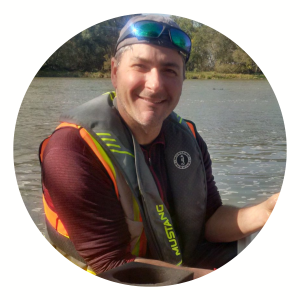 | Aquatic Ecotoxicology. Environmental Effects Research. Wastewater. Agriculture. Cumulative Effects Assessment. | Environment and Climate Change Canada |  |
Géraldine Delbès | Reproductive Toxicology. Toxicity of Environmental and Medical Substances on the Development of Male Germ Cells. | INRS | 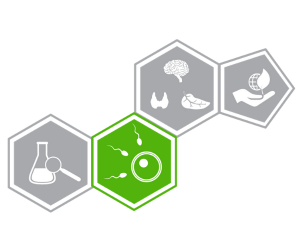 |
Glen Van Der Kraak | Ecotoxicology. Assessment of the Reproductive Capacity of Fish. | University of Guelph |  |
Gunilla Öberg | Science for Policy under Uncertainty. Chemical Management. Micropollutants. Chemical Regulation. Evaluation of Potential Harm Posed by Chemicals, Chemical Pollution. Sustainable Sewage Management. Chlorine Biogeochemistry. Environment. Sustainability. | The University of British Columbia |  |
Isabelle Plante | Ecotoxicology. Toxicology. Breast Cancer. Development of Mammary Glands. | INRS | 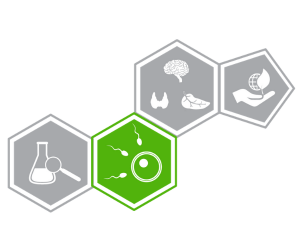 |
Jacques Bernier | Disruptions of the Immune System. Apoptosis. Cancer Genomic Stability and Resistance to the Toxicant. Inflammation. | INRS |  |
Jacques Robert | Environmental Medicine. Microbiology. Developmental Immunology. Tumor and Viral Immunity. Evolution of Immune Surveillance. | University of Rochester |  |
Jan Mennigen | Ecotoxicology. Comparative Physiology of Metabolism. Metabolic Disease. Inter- and Trans-Generational Effects. Hormones in the Context of Comparative Epigenetics Including Post-Transcriptional Regulatory Mechanisms. | Université d’Ottawa |  |
Jean-François Blais | Sanitation and Decontamination. | INRS | 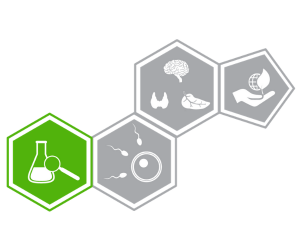 |
Jean-Pierre Le Bourhis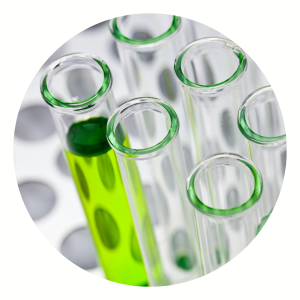 | Sociology of Public Action. Environment and Environmental Health. | CNRS |  |
Jennifer Joan Adibi | Epidemiology. Developmental Biology. Biomarker Design and Analysis. | University of Pittsburgh |  |
Jessica Head | Ecotoxicology. Molecular Biology. Environmental Risk Assessment. | McGill |  |
Joanne Parrott | Development of Fish Bioassays for Reproductive and Endocrine Effects. | Environment and Climate Change Canada |  |
Joëlle Dupont  | Animal Physiology and Farming Systems. Interaction between Metabolism and Reproductive Functions. | Institut National de la Recherche Agronomique |  |
Johanne Saint-Charles | Ecosystem Approach to Health. Communication. Environment. Social Networks. Sustainable Health. Social and Gender Equity. | UQAM |  |
Jon Doering | Ecotoxicology. Molecular Toxicology. Predictive Toxicology. Species Extrapolation. Ecological Risk Assessment. | Louisiana State University |  |
Jonathan Verreault | Ecotoxicology. Comparative Toxicology of Avian Species. Disruption of the Thyroid Axis. | UQAM |  |
Juan Fernandino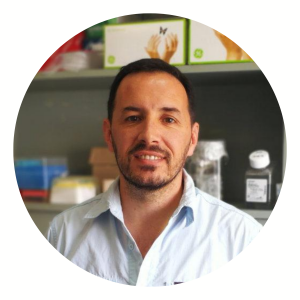 | Molecular Biology. Biotechnology. Reproductive Physiology of Fish. | Instituto Tecnológico de Chascomús |  |
Julie Robitaille | Ecotoxicology. Environmental risk assessment. In vitro bioassay. Fish reproduction. Waste water. Pesticides | Ministère de l'Environnement et de la Lutte contre les changements climatiques | 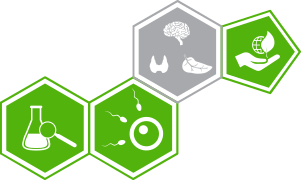 |
Karem Chokmani | Remote Sensing and Hydrology. | INRS |  |
Kelly Munkittrick | Ecosystem Health Assessment. Cumulative Effects Assessment. Monitoring of Environmental Effects. Ecotoxicology. Reproduction of Fish. | University of Calgary |  |
Kessen Patten | Genetics. Neurodegenerative Diseases. | INRS |  |
Laia Navarro-Martin | Ecotoxicology. Multi-Omic Epigenetics. | Consejo Superior de Investigaciones Científicas |  |
Larissa Takser | Epidemiology and Biostatistics. Cognitive Development of the Child. Pregnancy / Childbirth. Metabolism of Toxic Agents. Community Health / Public Health. Environmental Health. | Université de Sherbrooke |  |
Laura Vandenberg | Hazard Assessment. Developmental Biology. Endocrinology. | University of Massachusetts |  |
Lise Parent | Aquatic Ecotoxicology. Environmental Health. Environmental Contamination. Environmental Risk Assessment. Sex and Gender in the Environment. Environmental Hypersensitivity. Environmental Education. | TÉLUQ | 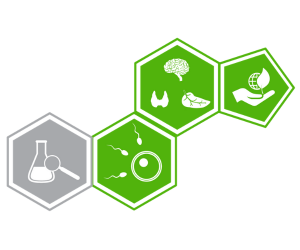 |
Lorraine Chalifour | Cardiovascular Diseases. | McGill |  |
Louise Vandelac | Environmental Health and Ecohealth Approach. Water, Environment and Health. Political Ecology. Public Policies and Scientific and Social Evaluation Systems. Agrifood Systems and Pesticides. Environmental Sciences. Major Risks and Sociology. | UQAM |  |
Louise Winn | Biomedical and Molecular Sciences. | Queen’s University |  |
Magali Houde | Distribution, Bioaccumulation and Effects of Chemicals on Aquatic Organisms. | Environment and Climate Change Canada |  |
Marc-André Verner | Toxicology. Toxicological Risk Analysis. Women's Health / Maternal Health / Maternity. Environmental Health. Chemical Contaminants. Persistent Organic Pollutants. Pesticides. | Université de Montréal | 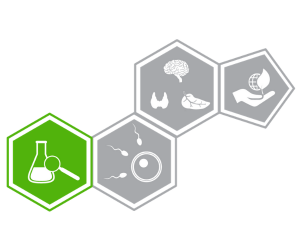 |
Marianne Métivier | Biology. Water Sciences. Water Quality Criteria. Ecotoxicology. Environmental Risk Assessment. | Ministère de l'Environnement et de la Lutte contre les changements climatiques |  |
Maricor Arlos | Environmental Engineering. Environmental Chemistry. NanoTechnology. Ecotoxicology. Emerging Contaminants. Environmental Risk Assessment. Wastewater. Water Treatment. | University of Alberta |  |
Marie-Élise Parent | Epidemiology of Cancer. Prostate Cancer. Environmental Exposures. | INRS |  |
Mark McMaster | Aquatic Toxicology. Fish Reproductive Health. Environmental Effects Monitoring. Wastewater. Cumulative Effects Assessment. | Environment and Climate Change Canada |  |
Mark Servos | Ecotoxicology and Integrated Management of Water Resources. Environmental Exposure and Effects of Emerging Contaminants in the Environment. | University of Waterloo |  |
Markus Hecker | Biological Effects of Environmental Stressors. Environmental Risk Assessment. Aquatic Ecology / Fish Biology. Development and Application of Bioanalytical Techniques to Assess Environmental Pollution. Toxicogenomics; New Approach Methods. Adverse Outcome Pathways. | University of Saskatchewan |  |
Martin Pelletier | Infectious and Immune Diseases. Inflammatory Diseases. Arthritis. | Université Laval |  |
Maryse Bouchard | Environmental Epidemiology. Environmental Health. Reproductive Health. Toxicological Risk Analysis. Potable Water. Persistent Organic Pollutants. Metals. Pesticides. | INRS |  |
Mélanie Desrosiers | Ecotoxicological Risk Assessment. Sediment. Toxicity. Bioaccumulation. Benthic Community. Contaminants of Emerging Interest. | Ministère de l'Environnement et de la Lutte contre les changements climatiques |  |
Mercedes Blázquez | Molecular Cloning. Cell Culture. Electrophoresis. Sexual Differentiation. Gene Expression. Molecular Biology. Endocrinology. Genetic. Physiology. Fish. | Consejo Superior de Investigaciones Científicas |  |
Mike Wade | Endocrine and Reproductive Toxicity in Males. Toxicology. Reproductive Biology. Molecular Toxicology. Reproductive Health. Thyroid. Gene Expression. Ecotoxicology. Regulatory Testing and Evaluation of Endocrine Disruptors. | Health Canada |  |
Nancy Denslow | Aquatic Toxicology. Gene Expression. Molecular Biology. Endocrinology. Biotechnology. Regulation of Genes. Next-Generation Sequencing. OMICS Technologies Including Proteomics, Transcriptomics and Lipidomics. | University of Florida |  |
Natacha Hogan | Environmental and Human Toxicology. in vitro Bioassays. Environment-Immune Interactions in Disease Susceptibility. Nutritional Toxicology. | University of Saskatchewan |  |
Nicolas Buisine | Comparative Physiology. Structural and Functional Genomic Analyzes. Bioinformatics. | Muséum d’Histoire Naturelle de Paris |  |
Niladri basu | Environmental Health. Ecotoxicology. Overall Health. Risk Assessment. | McGill |  |
Pascal Vaudin | Animal Biology and Genetics. Physiology of Reproduction and Behavior. | Université de Tours |  |
Patrice Gonzalez | Aquatic Ecotoxicology. Molecular Biology. | CNRS |  |
Patricia Rannaud-Bartaire | Pediatric endocrinology and diabetology | Hôpital Saint-Vincent-De-Paul |  |
Patricia Pinto | Comparative Endocrinology; Endocrine Disruption; Reproduction; Fish barrier tissues; Fish microbiomes; In vitro and in vivo fish experimentation; Metagenomics; Transcriptomics; Proteomics; Ecotoxicology; Aquaculture; Food Quality / Deterioration. | Algarve Centre of Marine Sciences (CCMAR-Algarve) |  |
Patrick Drogui | Electrotechnologies. Water Treatment. | INRS |  |
Paula Duarte-Guterman | Behavioural Neuroscience in Rodents. Hormones. Metabolism. Parental Experience. Environment, Adult Neurogenesis and Plasticity. Aging, Learning and Memory. | Brock University |  |
Pedro Segura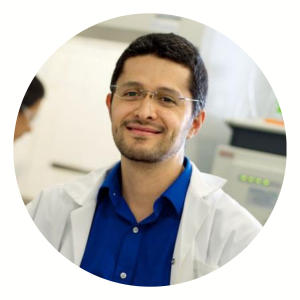 | Toxicity. Chemical and Biological Contamination in the Environment and Food. | Université de Sherbrooke |  |
Petya Grigorova | Developmental and Reproductive Toxicology. Environmental Exposures. Environmental Health. Epidemiology. | TÉLUQ |  |
Ryan Prosser | Mollusk Biology. Ecotoxicology. Ecological Risk Assessment. Aquatic Toxicology. Soil Toxicology. | University of Guelph |  |
Sabrina Gravel | Risk Prevention. Exposure Assessment. Toxicology. Toxicodynamics. Flame Retardant. Electronic Recycling. | IRSST |  |
Saeid Homayouni | Remote Sensing and Environmental Geomatics. Geographic Information System. Geospatial Analysis. | INRS |  |
Sami Haddad | Toxicology and Risk Analysis. Toxicokinetics and Pharmacokinetics. Physiologically Based Modeling of the Toxicokinetics of Xenobiotics. Interactions Between Xenobiotics in Mixtures. Extrapolations in vitro-in vivo in Toxicokinetics. Exposure Estimate. Inhalation Exposures. | Université de Montréal |  |
Satinder Kaur Brar | Bioprocesses and Recovery of Residues (Agricultural, Agro-Industrial, Industrial, Municipal). Green Chemistry to Find Ecological Alternatives to Chemical Antibiotics. Industrial Microbiology. Environmental Chemistry. Emerging Contaminants. | York University |  |
Sébastien Sauvé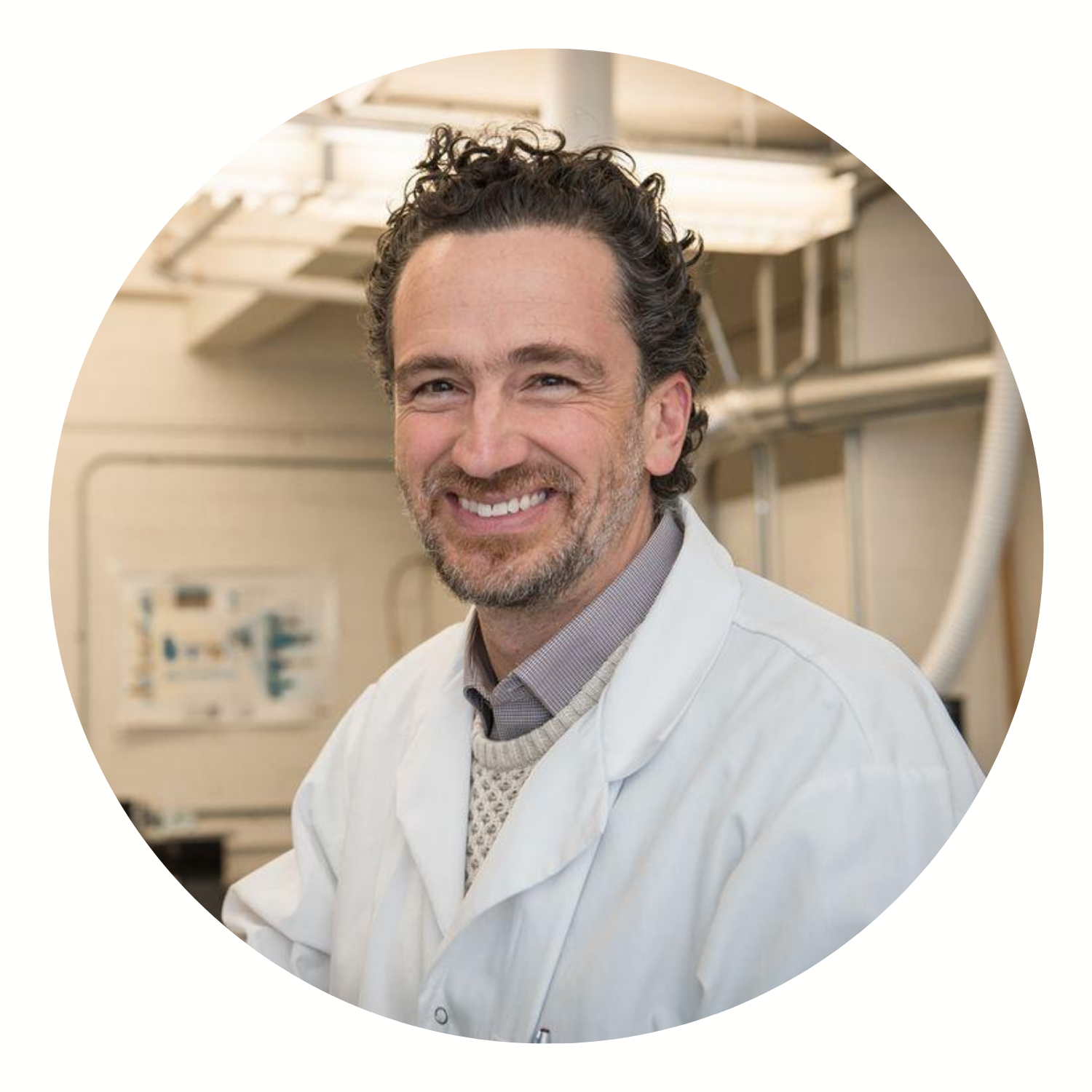 | Analytical Chemistry. Mass Spectrometry. Emerging Contaminants. Water Treatment. Circular Economy. Soils. | Université de Montréal |  |
Stéphane Bayen | Food Safety. Mass Spectrometry. Analytical Chemistry. Environmental Science. Food Science. | McGill |  |
Stéphane Reynaud | Aquatic Ecotoxicology. Physiology. Energy Metabolism. Transgenerational Effects. | Université Alpes-Grenobles |  |
Steve Wiseman | Aquatic and Mechanistic Toxicology. Long-Term Consequences (Within and Between Generations) of Acute Exposure to Natural and Anthropogenic Chemical Stressors. Effects of Early-Stage Exposure to Endocrine Disruptors. | University of Lethbridge |  |
Tara Barton-Maclaren | Risk Assessment and Risk Methodology. | Health Canada |  |
Thomas Sanderson | Toxicology. Endocrine Disruptors; Aromatase (CYP19); Steroidogenesis; Pesticides; Natural Compounds; Cytochrome P450. | INRS |  |
Valérie Langlois | Ecotoxicogenomics. Chemical Toxicology. Ecotoxicology. Animal Physiology. Endocrinology. Molecular Biology. Detection of Endocrine Disruptors Using Cell Lines. | INRS |  |
Vance L. Trudeau | Biology. Endocrinology. De.velopmental Biology. Physiology. Expression Profiling. Metabolism. Genomics. Neuroendocrinology. Reproduction. | Université d’Ottawa |  |
Vicki Marlatt | Applied Biology (Toxicology, Pest Control). Ecotoxicology. | Simon Fraser University |  |
Vikki Ho | Environmental Epidemiology. Nutrition. Cancer. Physical Activity. Exposure Measurement. Assessment of Occupational Exposure. Biomarkers. Environment. Life Habits. Exposure. Genetic. | Université de Montréal |  |
Virginie Cuvillier | Ecology. Biology. Biodiversity. Ecophysiology. Ecoimmunology. | Université de Lille |  |
Virginie Maillard | Physiology of Reproduction and Behavior. Lipid Metabolism. Nutrition. Molecular Physiology. Nutritional and Metabolic Diseases. Lipid Biomarkers. Ovarian Follicle Cells. Oxidative Stress. | Institut national de recherche pour l'agriculture, l'alimentation et l'environnement |  |
Yves St-Pierre | Cancer and metastases. Breast cancer. Galectin MMP. Galectins. Haematological cancers. Liquid biopsy. Microbiome. Environmental health. | INRS |  |
POST-DOCTORAL AND STUDENT MEMBERS
| NAME | RESEARCH PROJECT | YEAR | UNIVERSITY | UNIVERSITY LEVEL | RESEARCH DIRECTOR | THEMES | ||||
|---|---|---|---|---|---|---|---|---|---|---|
Aaron Balabo | Analyse des perturbateurs endocriniens environnementaux (PEE) dans les produits cosmétiques et denrées alimentaires : état de connaissances de la population kinoise et prévention Pourquoi j'étudie les perturbateurs endocriniens?: «J'étudie les perturbateurs endocriniens à cause de leurs effets deleteres sur la santé et l'environnement. Lorsque que j'ai appris les désastres que ces substances ont provoqués dans le passé et continuent encore aujourd'hui, je ne suis pas resté indifférent. J'apprends pour prévenir la population Congolaise qui semble sous informée de la ménace». | Current 2023- | Université de Kinshasa | MSc | Thierry Tangou Tabou |  | ||||
Albert Menéndez Pedriza | Integrative chemometric strategies for enhanced multiomic understanding of long-term effects of endocrine disruptors in ecotoxicological studies | Current 2021- | Institute of Environmental Assessment and Water Research | PhD | Laia Navarro Martin |  | ||||
Alec McDermott  | Unraveling the mechanisms involved in brominated flame retardants (BFRs)-induced breast cancer: moving away from rats with innovative models. I am studying endocrine disruptors because: "It is important to know the effects of endocrine disruptors, even more so, because of the new abundance of synthetic compounds. These have adverse effects on human health (modification of reproductive success, growth and increased risk of cancer). Who knows, maybe they are responsible for several other pathologies where the causes are more or less known? It is therefore important to understand their mechanisms of action as well as the potential for transgenerational transmission in order to prevent / stop future pathologies.’’ | Current 2022- | INRS | PhD | Isabelle Plante |  | ||||
Alexis Trinquet | Industrial additives and by-products in the aquatic environment: sources, trophodynamics, biotransformation and adverse effects | Current 2021 | Institut des sciences de la mer à Rimouski-UQAR | PhD | Gerald Tetreault |  | ||||
Ana Gisell Pazmino-Sosa | Role of microalgae in enhancing the photobiological degradation of EDCs. I am studying endocrine disruptors because: ''Endocrine disruptors are chemical compounds, both natural and human-made, that can interfere with the endocrine system's normal function. They are present in many products of daily use. At first, they were designed to improve product quality or make a process more efficient; however, scientists have found that even low doses of these compounds could be harmful to animal and human health. It is crucial to understand its nature, its effects, and find efficient ways to remove them from the environment and protect public health''. | Current 2020- | INRS | PhD | Valérie Langlois |  | ||||
Anita Thambirajah  | Epigenetic factors involved in thyroid hormone-dependent tadpole metamorphosis. Detection and monitoring of environmental contamination using transcriptomic assessments of native species. I am studying endocrine disruptors because: ''Endocrine disruptors can have profound and widespread effects within the environment and on human health and it is a scientific and social imperative to understand their consequences''. | Current 2018- | Univeristy of Victoria | Senior Research Associate | Caren Helbing |  | ||||
Annabelle Demy | Making endocrine disruptors governable: transnational expert struggles to define legitimate instruments for identifying hazards. I am studying endocrine disruptors because:''The regulatory framework for endocrine disruptors is important to deal with a range of health and environmental issues, my job is to map the institutions and actors invested in favour of and against this regulatory dynamic''. | Current 2019- | Université de Rennes 1 | PhD | Jean-Pierre Le Bourhis |  | ||||
Antoine Gillet | From a better understanding of endocrine disruption, exposure to cellular effects. I am studying endocrine disruptors because: "To understand the impact of our activities on the disruption of our hormonal system and to participate in the reductions of this impact". | Current 2021- | INRS | PhD | Géraldine Delbès | 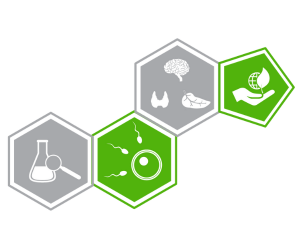 | ||||
Aurélie Lacouture | Study of the regulatory pathways of cell metabolism in the mammary gland. I am studying endocrine disruptors because: "As endocrine disruptors are found in breast milk, I intend to study their impact on the metabolism of the mammary gland". | Current 2020- | Université Laval | PhD | Étienne Audet-Walsh |  | ||||
Bianna Raven  | Hormonal regulation of spawning in anurans | Current 2020- | Université d'Ottawa | MSc | Vance L. Trudeau |  | ||||
Cameron Collins | AOP 310: Embryonic activation of the Ah Receptor in fishes leading to reproductive failure, via epigenetic down-regulation of GnRHR. | Current 2022- | Louisiana State University | PhD | Jon Doering |  | ||||
Cameron Confuorti | The Role of MicroRNA in the Regulation of Connexins and Mammary Gland Development: Implication of Hormones | Current 2021- | INRS | MSc | Isabelle Plante |  | ||||
Camille Lafront | Les fonctions génomiques des récepteurs aux estrogènes dans la prostate et le cancer de la prostate. I am studying endocrine disruptors because : "Given the omnipresence of endocrine disruptors in our environment, I am studying these molecules in the context of prostate cancer in order to assess their impact on the evolution of this disease". | Current 2020- | Université Laval | PhD | Étienne Audet-Walsh |  | ||||
Caren Akiki | Determination of contaminant profile in urban honey from Montreal using a non-targeted approach by LC-QTOF-MS. I am studying endocrine disruptors because: ''Endocrine disruptors are everywhere, in food, cosmetics, medicines, etc. These dangerous chemicals are well spread in the environment, and we are exposed to their harm since the early stages of our lives. The aim of my project is to detect and identify endocrine disruptors in urban outdoor air through two matrices; passive samplers of XAD resin, as well as samples of urban honey, which is one of the most consumed foods as "healthy"''. | Current 2021- | McGill | MSc | Stéphane Bayen |  | ||||
Chloe Devoy | Multigenerational effects of maternally deposited 1,2,5,6-Tetrabromocyclooctane (TBCO) on early life stage development and reproduction of Japanese medaka (Oryzias latipes) | Current 2021- | University of Lethbridge | MSc | Steve Wiseman |  | ||||
Cindy Peillex  | Glyphosate and bisphenol effects on health and immunity | Current 2020- | Centre de Physiopathologie Toulouse-Purpan | Master français 5 | Martin Pelletier |  | ||||
Coralie Turquois | Effects of contaminants on hormonal regulation and energy metabolism in two model avian species. | Current 2022- | UQAM | PhD | Jonathan Verreault | |||||
Corinaud Mahude | Prenatal exposure to PFAS, PBDE, and DDT and adiposity during development: The MIREC cohort | Current 2021- | Université de Montréal | PhD | Maryse Bouchard |  | ||||
Diana Castañeda-Cortés  | Genomic and Physiological Mechanisms of Androgen Signaling: Steroid 5-Reductase Knockout Investigation in Frogs | Current 2021- | INRS | Valérie Langlois |  | |||||
Elena Lonina | Mécanismes moléculaires de la signalisation des hormones thyroïdiennes dans le tissu épidermique | En cours 2019- | Univeristy of Victoria | MSc | Caren Helbing |  | ||||
Ellis Evans | Effects of selective estrogen and androgen receptor modulators on human neutrophils’ energy metabolism and functional responses | En cours 2023- | Université Laval | MSc | Martin Pelletier |  | ||||
Emma Field | Thyroid hormone signaling and disruption in the bullfrog olfactory epithelium during metamorphosis | En cours 2024- | University of Victoria | MSc | Caren Helbing |  | ||||
Emmanuelle Monniez | Université d'Ottawa | Vance L. Trudeau | ||||||||
Ève Pellerin  | Effects of bisphenol on the initiation and progression of bladder cancer. I am studying endocrine disruptors because: '' As endocrine disruptors are ubiquitous in our environment, it is important to study to better understand their impact on several diseases, including cancer''. | Current 2023- | Université Laval | MSc | Martin Pelletier |  | ||||
Fabien Joao | Role of estrogen in epigenetic reprogramming of male germ cells. | Current 2023- | INRS | PhD | Géraldine Delbès |  | ||||
France Caza | POMELO project (Plateforme multi-Omiques haut-débit pour l'anaLyse du stress perturbateur endOcrinien chez le poisson. I am studying endocrine disruptors because: ''In order to improve monitoring and the detection threshold of endocrine disruptions on the health of sentinel species and to raise awareness of the effect of minimum concentrations of the disruptor in the environment''. | Current 2021- | INRS | Yves St-Pierre |  | |||||
Ghida Baalbaki | Effect of contaminants associated with hydraulic fracturing on pregnancy and fetal development | Current 2021- | INRS | PhD | Géraldine Delbès |  | ||||
Hai-Wei Liang | Identification and validation of the role of the placenta in joint phthalate and dietary lipid effects on fetal brain development. I am studying endocrine disruptors because:''EDCs were known to disrupt normal endogenous hormones and thus may harm our health. Studying EDCs could provide more scientific insights for policy suggestions and future clinical/public health implementation''. | Current 2022- | University of Pittsburgh | PhD | Jennifer Joan Abidi |  | ||||
Haley Kuecks-Winger | Epigenetic factors controlling thyroid hormone dependent tadpole metamorphosis. I am studying endocrine disruptors because: ''It is critical that we identify novel endocrine disruptors in order to influence environmental and industrial policies. Additionally, by elucidating mechanisms of disruption, we can deepen our understanding of the endocrine system''. | Current 2020- | Univeristy of Victoria | MSc | Caren Helbing |  | ||||
Hela Rekik | Le développement de procédés électro-catalytiques avancés pour la décontamination des eaux contenant des substances perfluoroalkyliques et polyfluoroalkyliques (PFAS) Pourquoi j'étudie les perturbateurs endocriniens?: «J'étudie les perturbateurs endocriniens, dont font partie certains PFAS, car ils représentent un enjeu majeur dans le traitement des eaux contaminées. Voici les principales raisons : Impact sur la santé : Plusieurs PFAS sont considérés comme des perturbateurs endocriniens potentiels, pouvant affecter le système hormonal humain même à faibles doses. Comprendre leurs effets est crucial pour établir des normes de traitement adéquates. Persistance environnementale : Les PFAS sont extrêmement persistants dans l'environnement et dans les systèmes de traitement d'eau conventionnels. Étudier leur comportement en tant que perturbateurs endocriniens aide à développer des méthodes de traitement plus efficaces. Réglementation en évolution : Les normes concernant les PFAS dans l'eau deviennent de plus en plus strictes à mesure que nous comprenons mieux leurs effets perturbateurs endocriniens. Mon travail contribue à anticiper et répondre à ces évolutions réglementaires. Optimisation des traitements : En étudiant les mécanismes d'action des PFAS comme perturbateurs endocriniens, nous pouvons optimiser les processus d'électro-oxydation pour cibler spécifiquement ces effets. Évaluation des risques : Comprendre le potentiel de perturbation endocrinienne des PFAS permet une meilleure évaluation des risques associés à l'eau contaminée et à l'efficacité des traitements. En résumé, l'étude des perturbateurs endocriniens est essentielle pour développer des solutions de traitement des eaux efficaces et sûres face à la contamination par les PFAS». | En cours 2021- | INRS | PhD | Patrick Drogui |  | ||||
Hélène Pinatel | Effect of SARS-CoV-2 and the Covid-19 pandemic on placental functions. | Current 2021- | INRS | PhD | Cathy Vaillancourt |  | ||||
Hunter Johnson | Toxicities of benzotriazole ultraviolet stabilizers and polyaromatic hydrocarbons on early life-stage development of fishes | Current | University of Lethbridge | MSc | Steve Wiseman |  | ||||
Jacey Chou  | Endocrine and metabolic effects of nano plastics and flame-retardant BDE-47 in zebrafish | Current 2020- | Université d'Ottawa | BSc | Jan Mennigen |  | ||||
Jerry Achar | Uncertainty in the human health impact of endocrine disruptors. I am studying endocrine disruptors because: ''My research interest has always been in chemicals of emerging concern like Endocrine disruptors, including understanding their potential health impacts on humans. I am particularly driven by the need to improve the understanding of how uncertainty pervades scientific knowledge on endocrine disruptors (in regulatory contexts) and how this impacts the risk management of endocrine disruptors''. | Current 2020- | The University of British Columbia | PhD | Gunilla Oberg | 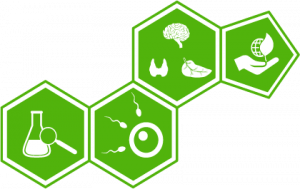 | ||||
Johanna Rivas | Biodiversity and chemistry of endocrine disruptors (EDs): characterization of molecular alterations induced by EDs, their interactions and their degradation products in a polyphagous insect. | Current 2021- | Sorbonne Université | PhD | David Siaussat |  | ||||
Josianne Bienvenue-Pariseault | Effect of melatonin on endoplasmic reticulum stress and mitophagy in the placental trophoblast | Current 2019- | INRS | PhD | Cathy Vaillancourt |  | ||||
Laura Pelland St-Pierre  | The role of endocrine disrupting chemicals in cancer etiology. I am studying endocrine disruptors because: “In Canada, cancer is the leading cause of death. Lung, breast, prostate and colorectal cancers are the most common cancers. The incidence and mortality of cancers differ by sex (lung, colorectal). Although lifestyle differences may partly explain some gender disparities, the determinants of these disparities are still not understood. A few studies have therefore been conducted to elucidate the effect of sex hormones in the development of cancer. Endocrine disruptors can act as modifiers of the functions of the endocrine system, which can cause several adverse health effects. One of the suspected effects is the development of cancer. Exposure to these chemicals is ubiquitous in the environment, but in people exposed at work, exposure occurs at significantly higher concentrations. This is why I am studying the link between occupational exposure to endocrine disruptors and the development of these cancers. This could help prevent their occurrence for certain workers with high occupational exposure ”. | Current 2019- | Université de Montréal | PhD | Vikki Ho |  | ||||
Linda Ok | Effect of depression and antidepressants in pregnancy on the serotonin system and iron transport in the human placenta | Current 2019- | INRS | PhD | Cathy Vaillancourt |  | ||||
Lorissa Corrie | Immune system responses in frog tadpoles. I am studying endocrine disruptors because: ''I am studying endocrine disruptors because the more I learn about them, the more I realize how little we know. I am particularly interested in the long-term, sublethal influence of endocrine disrupting chemicals on development''. | Current 2020- | Univeristy of Victoria | MSc | Caren Helbing |  | ||||
Maddie Empey  | Effects of insecticides on the development of anurans. I am studying endocrine disruptors because:''Information on the insecticide I am studying is somewhat lacking. I am therefore studying possible endocrine receptors to know how amphibians are affected by this and to increase knowledge on this subject''. | Current 2020- | Université d'Ottawa | MSc | Vance L. Trudeau |  | ||||
Madeleine Lépine  | Development and validation of innovative cellular models to predict breast cancer risks associated with endocrine disruptors such as PBDEs and their successors. I am studying endocrine disruptors because: ''Life on Earth holds in a beautiful balance which at any time can become unbalanced. We have every interest in understanding the causes of this imbalance in order to know how to ensure that the balance is maintained''. | Current 2022- | INRS | PhD | Isabelle Plante |  | ||||
Marie-Caroline Daguste | Social inequalities in exposure to endocrine disruptors. | Current 2023- | INRS | MSc | Isabelle Plante |  | ||||
Maryem Chekili | Occurrence of emerging pollutants in Osisko lake in Rouyn-Noranda. I am studying endocrine disruptors because: "Endocrine disruptors are ubiquitous compounds given the massive use of cosmetics, pharmaceuticals and industrial products. These persistent and toxic substances are released into the environment and pose a global threat to both human and environmental health. The detection of these disruptors as well as the in-depth study of the extent of their impacts are therefore necessary''. | Current 2020- | INRS | MSc | Jean-François Blais |  | ||||
Masoumeh Sabzalinejad | Effect of some novel pesticides on steroidogesis in co-culture model of breast cancer and feto-placental. | Current 2022- | INRS | PhD | Thomas Sanderson | 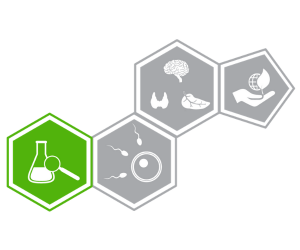 | ||||
Michael Allison | Comprehensive Health Assessment of Oolichan using Molecular Tools. I am studying endocrine disruptors because: ''Disruption of developmental signals may play a significant role in the ongoing disappearance of spawning oolichan on the Pacific coast''. | Current 2020- | University of Victoria | MSc | Caren Helbing |  | ||||
Mina Torkian Velashani | Measure 55 PFAS in samples of pre-pasteurized milk at Héma-Québec and assess the concentrations to which the Quebec population is exposed. | Current 2022- | université de Montréal | MSc | Marc-André Verner |  | ||||
Nancy He | Effect directed analysis of toxicants in processed food. I am studying endocrine disruptors because: ''Understanding exposures to endocrine disruptors and their long term effects is absolutely essential for protecting our health and well-being - for ourselves, for future generations, and for the planet''. | Current 2020- | McGill | PhD | Stéphane Bayen |  | ||||
Nicolas Nayrac  | Presence and behavior of microplastics in freshwater ecosystems. I am studying endocrine disruptors because: '' It is essential to better understand the fate of endocrine disruptors once in the environment because they are strongly suspected of having a negative impact on human health: breast cancer, diabetes and obesity, to name a few''. | Current 2019- | Université de Sherbrooke | PhD | Pedro Segura |  | ||||
Noémie Plattard | PBPK modeling of chlorinated derivatives of BPA and estimation of exposure of pregnant women. I am studying endocrine disruptors because: '' I am studying endocrine disruptors because these substances represent one of the major challenges of the 21st century for environmental health since they can be toxic at very low doses and there are very few studies of toxicities in human. It is therefore essential to study these substances in order to understand the diseases of tomorrow''. | Current 2019- | Université de Montréal | PhD | Sami Haddad |  | ||||
Oriol Cano Rocabayera | Adaptive plasticity as a key for invasion success in disturbed ecosystems | Current 2021- | University of Florida | PhD | Nancy Denslow |  | ||||
Oscar Dongwei Yu  | Effects of organophosphate ester flame retardants on the liver using in vitro and in vivo approaches | En cours 2019- | McGill | PhD | Barbara Hales |  | ||||
Oumaima El Hachimi | Integrated electro-BRM for the treatment of landfill leachate | Current 2020- | INRS | PhD | Jean-François Blais |  | ||||
Paisley Thomson | Effects of agrochemicals as endocrine disruptors in larval amphibians. I am studying endocrine disruptors because: ''Endocrine disruptors represent a class of pollutants that may have sub-lethal toxic properties in exposed wildlife. I’m particularly interested in studying the effects of such chemicals on amphibians, a taxon that is facing severe population declines. Evidence suggests that EDCs are playing a role in frog biodiversity loss, but there is still much to learn. For example, newly introduced products may not be acutely toxic, but induce adverse effects through interfering with normal hormone signaling. Perhaps gaining a better understanding of these effects will provide critical insights, allowing amphibian conservation efforts to be more successful''. | En cours 2023- | National Institutes of Health (NIH) |  | ||||||
Patricija Marjan | Impacts of tertiary-treated MWWE on transcriptome of longnose dace | Current 2020- | University of Calgary | Kelly Munkittrick |  | |||||
Patrick Ntantu | Pesticide exposure, neurodevelopment and the modifying effect of the PON1 genotype in children: The MIREC cohort | Current 2020- | Université de Montréal | PhD | Maryse Bouchard |  | ||||
Pax Mpoyi Tshimanga | The association between the concentration of manganese measured in different biomarkers of exposure and the cognitive and behavioral development of children in the Canadian MIREC cohort | Current 2020- | Université de Montréal | PhD | Maryse Bouchard |  | ||||
Pier-Olivier Leblanc | Effets du glyphosate et de ses métabolites sur le métabolisme énergétique et les réponses fonctionnelles des neutrophiles humains | En cours 2022- | Université Laval | MSc | Martin Pelletier |  | ||||
Pratik Kumar  | Biofiltration and behaviour of emerging contaminants. Wastewater treatment using algal biomass. I am studying endocrine disruptors because : ''Endocrine disruptors represent a potential threat to both environment and human health. It is a global challenge and as an environmental scientist working in the field of water treatment sectors, it is my responsibility to ensure the removal of these chemicals and consider them as an emerging risk vector in the aquatic ecosystem. The two-front challenge is to provide an effective water treatment solution for its removal and reducing the toxicity levels''. | Current 2020- | INRS | Satinder Kaur Brar |  | |||||
Pratishtha Khurana  | Green methods to remove antibiotic complexes and deepen their understanding | Current 2021- | York University | PhD | Satinder Kaur Brar |  | ||||
Rahmani Zahra  | Inter- and trans-generational consequences of nano-plastic and flame retardant BDE-47 exposure on metabolic and reproductive phenotypes in zebrafish | Current 2021- | Université d'Ottawa | PhD | Jan Mennigen |  | ||||
Rajiv Neal Tanna  | Development of tools to signal biological environmental change in the presence of MWWE. I am studying endocrine disruptors because: ''The study and dissemination of information relating to endocrine disruption in the environment underscores how inextricably linked humans are from their surrounding environment. This understanding is critical to developing policies and processes which preserve ecosystem health, and in doing so, environmental and human health more broadly''. | Current 2019- | University of Calgary | PhD | Kelly Munkittrick |  | ||||
Rama Pulicharla  | Mitigating the release of long-chain perfluorocarboxylic acids in leachates: Analysis, removal, fate and transport. I am studying endocrine disruptors because : ''All contaminants have the potential to interact with the endocrine system/hormonal system of life and show diverse effects at various concentrations. Identifying the potential endocrine disruptors and monitoring their levels are important to maintain the balance in the environment''. | Current 2020- | York University | Satinder Kaur Brar |  | |||||
Ramela Koumrouyan | Defining the hazard of UV stabilizers across avian species. | Current 2023- | McGill | PhD | Jessica Head |  | ||||
Raphaël Chackal  | Endocrine and metabolic effects of nano plastics and flame-retardant BDE-47 in zebrafish. I am studying endocrine disruptors because: ''As industrial pollution continuously increases, aquatic organisms face highly persistent environmental contaminants. In particular, Zebrafish are an important model for both ecotoxicological and human health. As a student with a passion for environmental preservation, I strongly believe this project will help shape future research''. | Current 2020- | Université d'Ottawa | BSc | Jan Mennigen |  | ||||
Rhizlane El Omri | Targeted analysis of DNA methylation in the male germline for screening for environmental influence. I am studying endocrine disruptors because: ''Endocrine disruptors are omnipresent in our lives and transform our physiology and that of other living organisms. It is essential to study the extent of their impact as well as the inter and transgenerational transmission of their effects''. | Current 2019- | INRS | PhD | Géraldine Delbès |  | ||||
Roxanne Bérubé | AhR pathway disruption by PFAS and the prevalence of metabolic health issues. | Current 2021- | Wayne State University | Christopher Kassotis |  | |||||
Sarah-Maude Goulet | Effets des monomères du Tritan sur le métabolisme et les fonctions des neutrophiles humains Pourquoi j'étudie les perturbateurs endocriniens?: «La recherche sur les perturbateurs endocriniens ubiquitaires est importante pour comprendre leur impact et risque pour la santé». | En cours 2024- | Université Laval | MSc | Martin Pelletier |  | ||||
Sodiq Olawoore | Mechanism of intragenerational oocyte maturation inhibition from early life stage exposure of Japanese medeka to the Brominated Flame retardant 1,2,5,6-Tetrabromocyclooctane (TBCO) via maternal transfer Pourquoi j'étudie les perturbateurs endocriniens?: «To better understand the numerous intricate mechanisms that lead to disruption of the reproductive axis via exposure to environmental stress». | En cours 2024- | University of Lethbridge | MSc | Steve Wiseman |  | ||||
Stephanie Marshall | Reproductive cycle in trout perch including natural variability at numerous sites. I am studying endocrine disruptors because: ''I am studying endocrine disruptors in trout perch to look at the reproductive cycle which will include natural variable that occurs in this species''. | Current 2021- | University of Calgary | MSc | Mark McMaster |  | ||||
Sylvie Veyrenc | Implication of epigenetic modifications in the transmission of transgenerational effects in male Xenopus | Current 2020- | Université Alpes-Grenobles | PhD | Stéphane Reynaud |  | ||||
Trisha Saha | Prenatal exposure to PFAS and neurobehavioral problems during development: The MIREC cohort. I am studying endocrine disruptors because: ''From the early days of my adolescence, I often wondered how environmental factors could have influenced my own development, both physical and psychological. Being constantly surrounded by chemicals, I find it super important to try to understand how these can affect our growth, in order to inform the population and put in place protective government policies''. | Current 2021- | Université de Montréal | MSc | Maryse Bouchard |  | ||||
Verônica Angélica Alves | The role of thyroid hormone receptors TRα and TRβ in reproduction of the Western clawed frog (Silurana tropicalis). I am studying endocrine disruptors because:''Endocrine disruptors chemicals (EDCs) are significant environmental risk factors for wildlife and human health. Nevertheless, EDCs are widely spread. Concern on this issue is relatively recent, and although knowledge on this field had a considerable advance in the last decades, many questions remain open. Understanding how the endocrine system works and how chemicals can disrupt this system is fundamental to support responsible decisions concerning environmental protection and, ultimately, our health''. | Current | INRS | PhD | Valérie Langlois |  | ||||
Xiaotong Wang | Effects of organosphosphate esters on ovarian granulosa cells. | Current 2017- | McGill | PhD | Barbara Hales |  | ||||
Yamin Raza | The Effects of UV-Stabilizers on Oocyte Maturation and Reproductive Performance in Zebrafish | Current 2020- | University of Lethbridge | BSc | Steve Wiseman |  | ||||
Yeon Seon Jeon | Understanding the Variability in Avian Transcriptomic Responses to Environmental Chemicals: A Case Study with Ethinylestradiol | Current 2018- | McGill | PhD | Jessica Head |  | ||||
Zabado Jean François Roméo Tiégan | Study of the epigenetic effects of airborne endocrine disruptors. I am studying endocrine disruptors because: ''It is a subject that is not well known in West Africa in general and in Burkina Faso in particular. My objectives are to be a specialist in the field, to promote the results of research through conferences, workshops, symposium, and to raise awareness of the dangerousness of the effects of endocrine disruptors or pesticides on health''. | Current 2022- | Université Joseph KI-ZERBO | PhD | Djigma Wendkuuni Florencia |  | ||||
Zhi Hao Chi | Non-targeted analysis of contaminants in human milk. I am studying endocrine disruptors because: ''The study for endocrine-disrupting chemicals is important in order to understand how they work and define their role in health and disease. Novel approaches such as non-targeted screening of endocrine-disrupting chemicals in biological matrices such as human milk allow for the identification of a wide range of unknown chemicals. These detected chemicals can be analyzed for their endocrine-disrupting activity, and will lead to a better understanding concerning their potential impact on infant development during breastfeeding''. | Current 2019- | McGill | PhD | Stéphane Bayen |  | ||||
Zixuan Li | Effects of environmental toxicants on the adrenal gland | Current 2019- | McGill | PhD | Barbara Hales |  | ||||
Alexis Paré | Analyse dynamique et fonctionnelle des réseaux allostériques chez la galectine-13 humain | Gradué 2021-2023 | INRS | MSc | Cathy Vaillancourt |  | ||||
Bélinda Crobeddu  | Plasticizgers and mammary gland health. I am studying endocrine disruptors because: “The hyperproduction and hyperconsumption of our society has led to the emergence of endocrine disruptors. The diversity and quantity of these compounds follows a maddening growth. It is our duty as a toxicologist to understand their effects on ecosystems and human health in order to protect future generations”. | Graduate 2016-2022 | INRS | PhD | Isabelle Plante |  | ||||
Corinaud Mahude | Exposition prénatale aux PFAS, PBDE, et DDT et adiposité au cours du développement: La cohorte MIREC | Gradué 2019-2024 | Université de Montréal | PhD | Maryse Bouchard |  | ||||
Diana Bedolla López | Science risk communication related to chemicals MA in Resources, environment and sustainability | Graduate 2020-2022 | The University of British Columbia | MSc | Gunilla Oberg |  | ||||
Georgia Green | Development of a method to identify diverging perspectives of relevance for chemicals management. I am studying endocrine disruptors because: ''Experts disagree on how to manage endocrine disruptors, which can lead to certain perspectives been excluded in regulation. My research aims to make this process more transparent''. | Graduate 2020-2022 | The University of British Columbia | MSc | Gunilla Oberg |  | ||||
Hajime Kurita  | Toxicity assessment of a novel oil dispersant based on engineered silica nanoparticles | Graduate 2017-2022 | University of Florida | PhD | Nancy Denslow |  | ||||
Jack Durant | Epistemic communities and uncertainty in endocrine disruptor risk assessment. I am studying endocrine disruptors because: ''I'm studying endocrine disruptors because I think it poses one of the major environmental and human health challenges of our time and I believe it gets scant attention given its seriousness''. | Graduate 2019-2021 | The University of British Columbia | MSc | Gunilla Oberg |  | ||||
Jon Doering | Ecotoxicology and Epigenetics: Extrapolating Later-life Adverse Reproductive Effects of Early-life Chemical Exposures from Laboratory Model Fish Species to Native Fish Species of Regulatory Concern in Canada | Graduate 2020-2021 | University of Lethbridge | Steve Wiseman |  | |||||
Julie Robitaille | Study of endocrine disruptors: From the synthesis of androgens in amphibians to the detection of endocrine disruptors in wastewater | Graduate 2023 | INRS | PhD | Valérie Langlois | 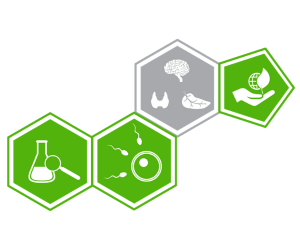 | ||||
Laurie Pinel | Development of a novel stem cell organoid model from the epididymis | Graduate 2016-2021 | INRS | PhD | Daniel Cyr |  | ||||
Luca Campisi | Endocrine Disrupting Chemicals (EDCs): improving the current health risk assessment procedure through theoretical and experimental approaches. | Graduate 2020-2024 | University of Pisa | PhD | Concettina La Motta |  | ||||
Meagan Marcoux  | Effects of the herbicide glyphosate and its metabolites on energy metabolism of human neutrophils. I am studying endocrine disruptors because: ''I study endocrine disruptors because, like a poison, they can have considerable effects on human health even in small doses". | Graduate 2020-2020 | Université Laval | BSc | Martin Pelletier |  | ||||
Melany Juárez | Exposure to brominated flame retardants during sensitive periods of development: an increased risk for breast and ovarian cancers? I am studying endocrine disruptors because: ''I have always been passionated about understanding how everything works in the environment, later on in life I started to realized all the process going on in the inside of a living being. Therefore, my passion started to evolve into understanding the physiological process of health inside the living beings. This pathway brought me to the endocrine disruptors and its effects in living beings''. | Graduate 2020-2024 | INRS | PhD | Isabelle Plante |  | ||||
Morgane Robles  | Effect of maternal stress, depression and anxiety during pregnancy on placental functions and infant neurodevelopment | Graduate 2019-2021 | INRS | Cathy Vaillancourt |  | |||||
Nahiyan Khan | Use of personal care and biomonitoring products in young people. I am studying endocrine disruptors because: ''Endocrine disruptors threaten human health on a global scale. Invisible, they are part of our daily life, hence the importance of knowing the influence of these chemicals on the health of all. In addition, during my bachelor's degree in biochemistry, I developed a great interest in research on these chemicals that are harmful to the endocrine system. From these facts, the study of endocrine disruptors, as well as their effects on health is of great importance and would aid in the development of policies aimed at protecting human health and environmental health''. | Graduate 2021-2023 | Université de Montréal | MSc | Maryse Bouchard |  | ||||
Natasha Letourneau | Impact of doxorubicin on neonatal rat testis and the potential protection by flavaglines | Graduate 2018-2022 | INRS | MSc | Géraldine Delbès |  | ||||
Sylvie Pinto | Role of EDCs in cellular differentiation of the epididymis | Graduate 2019-2024 | INRS | PhD | Daniel Cyr |  | ||||
Tifen el Belaidi | Role of signalling pathways and effects of EDCs in cellular differentiation of epididymal stem cells | Graduate 2019-2024 | INRS | PhD | Daniel Cyr |  | ||||
Rita Gouesse | Effects of BFRs on the development of the mammary glands | Graduate 2017-2020 | INRS | PhD | Isabelle Plante |  | ||||
Ruben Martinez  | Integrative analysis of endocrine disruption in zebrafish (Danio rerio). I am studying endocrine disruptors because: ''The ‘recent-discovered’ endocrine disruptors present in the environment highlighted our need to study their adverse effects both over the wildlife and in humans, which can be related to several disorders like obesity, infertility or several metabolic syndromes. The ignorance cannot be an excuse to do not act and to replace certain chemicals with endocrine disrupting properties by other more innocuous substitutes''. | Graduate 2016-2020 | Consejo Superior de Investigaciones Científicas | PhD | Laia Navarro Martin |  | ||||
Valérie Jolicoeur | Impact of organohalogen contaminants on the thyroid axis of St. Lawrence belugas | Graduate 2019-2021 | UQAM | MSc | Jonathan Verreault |  | ||||
Yesenia Blasco Navarro  | Morphometric and epigenetic alterations of zebrafish eleutheroembryos exposed to EDCs | Graduate 2019-2020 | Consejo Superior de Investigaciones Científicas | MSc | Laia Navarro Martin |  |
COLLABORATORS
| NAME | ORGANIZATION |
|---|---|
| Christopher Tubbs | San Diego Zoo Wildlife Alliance |
| Debbie Montjean | Fertilys |
| Gregory Lemkine | Laboratoire Watchfrog |
| Damien Baudiffier | Fondation Evertéa |